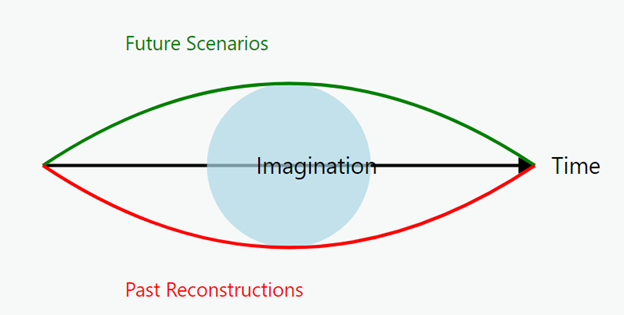Is it reasonable to assume that the
time is a mean of imagination?
Time as
a mean of Imagination
This is a
fascinating and profound question that delves into the heart of our
understanding of both time and imagination. Let's explore this idea in depth.
Time as a
Mean of Imagination
Click to
open image
The
proposition that time is a mean of imagination is indeed a reasonable and
thought-provoking concept. Let's break this down and examine its implications:
- Time as a Framework for
Imagination: Time provides the underlying structure within which
imagination operates. Our ability to imagine is intrinsically linked to
our concept of past, present, and future. Without time, we would be locked
in an eternal present, unable to conceive of change or possibility.
- Imagination as Time Travel: In a
sense, imagination allows us to "travel" through time mentally.
We can reconstruct past events and project ourselves into potential
futures. This mental time travel is a fundamental aspect of human
cognition and is deeply tied to our ability to imagine.
- Time as a Continuum of
Possibilities: If we view time as a mean (in the mathematical sense) of
imagination, we could conceptualize it as a continuous spectrum of
imaginative possibilities. The present moment would be the average or
central point, with past reconstructions and future projections extending
in either direction.
- Imagination Shaping Perception
of Time: Our perception of time is not fixed but can be altered by our
imaginative faculties. When we're engaged in creative or immersive
imaginative experiences, our sense of time can become distorted. This
suggests a reciprocal relationship between time and imagination.
- Time as a Product of
Imagination: Some philosophical and scientific theories propose that our
linear experience of time is itself a construct of consciousness. In this
view, time could be seen as an emergent property of our ability to imagine
sequences and changes.
- Imagination as a Bridge Between
Timeframes: Our capacity to imagine allows us to connect past experiences
with future possibilities, creating a coherent narrative of our existence
across time. In this sense, imagination serves as the medium through which
different timeframes interact.
Philosophical
Implications:
- Nature of Reality: If time is a
mean of imagination, it raises questions about the objective reality of
time itself. Is time a fundamental property of the universe, or is it a
construct of our imaginative consciousness?
- Free Will and Determinism: This
concept could impact our understanding of free will. If our experience of
time is shaped by imagination, does this enhance our ability to shape our
future, or is it merely an illusion of choice?
- Consciousness and Self: The idea
ties into theories of consciousness that view our sense of self as a
narrative constructed through time. Imagination could be seen as the tool
that weaves this narrative.
- Epistemology: It challenges our
understanding of knowledge acquisition. If our perception of time is
mediated by imagination, how does this affect the reliability of our
memories and predictions?
- Creativity and Innovation:
Viewing time as a mean of imagination emphasizes the role of creative
thinking in shaping both our understanding of the past and our visions of
the future.
Potential
Criticisms and Limitations:
- Objective Time: This view might
conflict with scientific understandings of time as a physical dimension.
- Causality: It could complicate
our understanding of cause and effect if time is seen as primarily
imaginative rather than objective.
- Shared Reality: If time is a
mean of imagination, how do we account for the shared experience of time
across individuals and cultures?
- Non-human Experience: This
concept might be anthropocentric, not accounting for how other forms of
life or potential AI might experience time.
In
conclusion, the idea that time is a mean of imagination is a compelling
philosophical proposition. It highlights the intricate relationship between our
perception of time and our capacity for imaginative thought. While it may not
align perfectly with scientific understandings of time as a physical dimension,
it offers a rich framework for exploring the nature of human consciousness,
creativity, and our relationship with past and future. This concept invites us
to reconsider our assumptions about the nature of time and imagination,
potentially leading to new insights in fields ranging from psychology and
neuroscience to physics and philosophy of mind.

Comments
Post a Comment